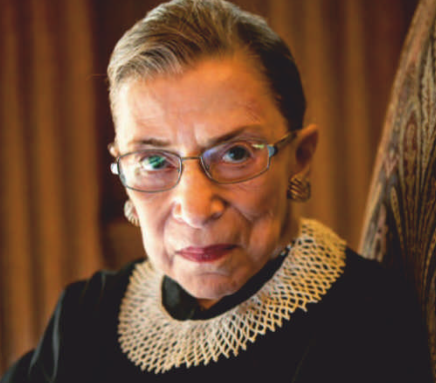Ruth Bader Ginsburg, the liberal conscience of America’s Supreme Court, died on September 18th, aged 87
美國最高法院的自由派良知魯斯·巴德·金斯伯格于9月18日逝世,享年87歲。
On the evening of July 11th 2015, Ruth Bader Ginsburg went to the opera. There was nothing odd in that. Opera, after the law, was her great love, the only place where she could leave the legal world behind. When she worked on her opinions, often into the small hours if her husband Marty was not around to make her go to bed, she would usually have opera, or some other beautiful music, playing in the background.
2015年7月11日晚,魯斯·巴德·金斯伯格去看歌劇。這沒什么奇怪的。在法律之后,歌劇是她最大的愛好,是她唯一可以把法律世界拋在身后的地方。在為自己的觀點(diǎn)而努力時(shí),魯斯經(jīng)常工作到凌晨,如果她的丈夫馬蒂不在旁邊哄她睡覺,她通常會用歌劇或其他美妙的音樂作為背景音樂。
The talent she most coveted was to have a glorious voice, like Renata Tebaldi perhaps. As it was, she sang only in the shower and in her dreams. This particular opera, however, “Scalia/Ginsburg”, by Derrick Wang, was about her. It featured Antonin Scalia, then the court’s most scathing conservative, and she, its most notorious liberal, duelling musically in the styles of Mozart, Verdi and Puccini. He had to go through various trials; she helped him out, at one point soaring through a glass ceiling in the character of the Queen of the Night from “The Magic Flute”. She loved it all. She and Scalia, despite the legal zingers he tossed in her direction, had been best buddies since their days together on the dc federal appeals court in the 1980s.
她最渴望的才能是擁有一副美妙的嗓音,也許就像雷娜塔·蒂波迪那樣。事實(shí)上,魯斯只在淋浴時(shí)和夢中唱歌。然而,德里克·王的歌劇《斯卡利亞/金斯伯格》就是關(guān)于她的。它的主角是安東寧·斯卡利亞,當(dāng)時(shí)最高法院最嚴(yán)厲的保守派,而她,這個(gè)最臭名昭著的自由主義者,在音樂上以莫扎特、威爾第和普契尼的風(fēng)格奮戰(zhàn)。他必須經(jīng)歷各種審判;魯斯則幫他走出困境,在《魔笛》中,她憑借飾演“夜女王”一角曾一度沖破玻璃天花板。魯斯都喜歡。盡管斯卡利亞對她說了一些法律上有力的反駁,但她和斯卡利亞自上世紀(jì)80年代在特區(qū)聯(lián)邦上訴法院一起工作以來就是最好的朋友。

And America’s highest court could be just as dramatic, even if more sombrely arrayed. There she sat, this tiny little woman perched among the black-robed men, and there she disagreed. For all but three of her 27 years she had one or two sisterly colleagues, but her opinions still marked her out. She berated the court when, in 2014, it let employers foist their religious beliefs on their workers by not paying for cover for contraception. She was outraged when, in the Citizens United case of 2010, it refused to limit corporate funding of independent political broadcasts, as if America had all the democracy that money could buy.
而美國最高法院也可能同樣引人注目,盡管其排列更為莊重。魯斯坐在那里,這個(gè)瘦小的女人坐在一群黑袍男人中間,持反對意見。在她27年的職業(yè)生涯中,除了3年之外,她都有一兩個(gè)姐妹同事,但她的觀點(diǎn)仍然讓她脫穎而出。2014年,法院允許雇主通過不覆蓋避孕費(fèi)用的方式,將自己的宗教信仰強(qiáng)加給員工,魯斯對此大加斥責(zé)。在2010年的聯(lián)合公民案中,法院拒絕限制公司對獨(dú)立政治廣播的資助,就好像美國擁有金錢所能買到的一切民主一樣。魯斯對此極其憤怒。
譯文由可可原創(chuàng),僅供學(xué)習(xí)交流使用,未經(jīng)許可請勿轉(zhuǎn)載。












